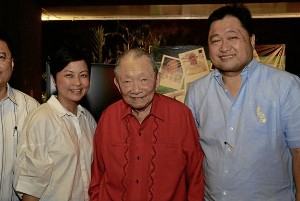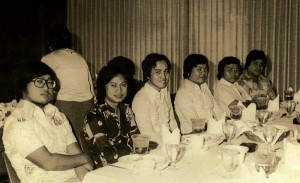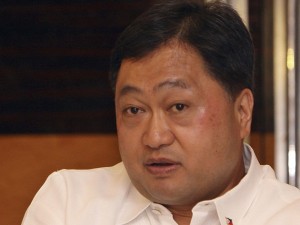Get to know Cesar Purisima
When Cesar V. Purisima was growing up in the 60s, his family spent summer vacations in Manila away from their home in General Santos in South Cotabato. They traveled by sea, which took a week or so because of the many port calls, and used different lodgings such as the Aloha Hotel.
Back then, the nearby Bangko Sentral ng Pilipinas Complex—where the country’s Finance Secretaries would eventually set up headquarters—was not yet a landmark along Roxas Boulevard. While the beach front thoroughfare has not let go of its old name Dewey (Boulevard), the sprawling reclamation area in the bay was rising to be the Cultural Center of the Philippines Complex that would host global events such as meetings of the International Monetary Fund and World Bank, where Purisima sits as alternate governor and governor, respectively.
And so the son of an Ilocano lawyer who migrated to Mindanao enjoyed cosmopolitan respite from the rural idyll of GenSan town before it became the country’s tuna capital and home of boxing champions (like Manny Pacquiao).
“GenSan in the ’60s was totally different—a pineapple, banana, corn and livestock country,” Purisima says. “There were very few people there. There was no TV, and electricity supply was not (as stable as it is these days).”
Before taking on responsibilities of international scope became matter-of- course for Purisima, he was a promdi among urbanites.
In 1971, his father—an erstwhile secretary to Sen. Salipada Pendatun— was elected as delegate to the Constitutional Convention and the family moved to Quezon City. This coincided with his starting high school in Marikina.
“In high school, I was the new kid with a different accent,” he says. “People noticed and I had to adjust, that’s how I dealt with it.”
Back when fluency in a different language was less appreciated, it did not help that the elementary school he attended in GenSan heavily used the vernacular. Upon relocating, Purisima did not have the confidence in speaking— especially in English—because of his Cebuano accent.
“As a kid, I was better with numbers than I was with words. In grade school, I took part in math contests,” the former chair of SGV and Co. says of a skill that defined his future.
But before that future dawned, Purisima needed to blend in with his new surroundings and he did, becoming just one of the guys. Later in life, as a manager of people, he would look back to this transition as inculcating in him the importance of being able to work with different kinds of people.
In the meantime, he enjoyed playing chess with his classmates, with them competing in tournaments and dreaming of becoming grand masters.
“From our school in Marikina, we would take public transport and go to Cubao, where the Philippine Chess Federation is,” he recounts. “We would play with masters who took on several opponents simultaneously.”
Purisima’s father was supportive of his passion in chess, considering that it developed analytical skills, something very important in the legal profession.
“My dad wanted me to be a lawyer,” he says. “He and my uncles were very passionate about their profession and they were always trying to be too helpful (to someone still planning a career).”
Time and again, Purisima would demonstrate how he values the examples of his role models. He started school two years early than usual— at age four when school admission was less strict—because he wanted to always be with a cousin who had gone to kindergarten. He would embark on a career following the path of professors who held jobs outside the academe. He would seek post-graduate education abroad because his corporate mentors did.
Even then, Purisima would also show that he may add to or even digress from the influence of his seniors —he never became a lawyer, and he is today remembered as the leader of a group of defiant cabinet officials that told President Gloria Arroyo to resign.

HE FOUND the accountant’s workload too taxing for romance, but Purisima had become SGV chair like Washington Sycip when he met his future wife Corrie.
“I (did want) to become a lawyer, but a CPA-lawyer, so I took up accounting in La Salle,” he says.
However, the young Purisima wasn’t so crazy about studying. “I wanted to just have fun, play. I finished high school when I was 14 and, in hindsight, I prefer to have started school later when I would have been more mature.”
He describes himself to have been an average college student student until the last two years when he became more serious in his studies. By then, Martial Law was marking one of its pivotal times with the 1978 Interim Batasang Pambansa election. Also by then, Purisima discovered student politics and became part of the student council.
“That’s where I learned how to work with people and became more conscious about social causes,” he says. “I think what you learn outside the classroom—in extracurricular projects and discussions with classmates and teachers—is more important than what you learn inside. That’s where you get your ability to work with others.”
Before graduating, he had entertained the idea of following some of the teachers he met, who were also working for accounting firms. And after landing among the top placers in the certified public accountant board exams of 1979, Purisima decided to join SGV.
The company made such an impression on him that he considers it as “probably one of the very few places in Philippines that is a true meritocracy.”
“You really move up based on what you do,” he says. “That is where I developed my work ethic and my attitude in life.”
He had told his father that he would work for just a couple of years and then go to law school. But before the time was up, he was off to Chicago to get an MBA degree.
“When I was starting at SGV, my bosses were not lawyers but accountants who have MBAs, and they were doing well,” Purisima shares. “So I told my dad, I’ll just take up MBA, then I’ll take up law.”
After graduating from Northwestern University and rejoining SGV, he became engrossed with his job.
“I was doing well, I became a partner and I wanted to continue moving up,” he says. “I thought, ‘why do I need to be a lawyer?’”
Anyway, at that point, Purisima was already established in his career that his father was no longer pushing him to become a lawyer.
Describing his management style, Purisima says he is a people person.
“I believe that you’re only as good as your people,” he says. “I am fortunate that in my current job I have very good people around me. I believe the main role of the head of an organization is to set the direction set the tone and motivate the team.”
He calls it the “high-touch style.” Even in his SGV days, he likes walking around the office, seeing the people work and talking to them. That’s how you get to know what’s going on, he says.
“I think my background helped me to adjust to working with people and I would not have accomplished what I did without that ability to train and develop people,” Purisima says.
“And I owe all of this to my parents, from whom I learned about the importance of hard work,” he adds. “My dad was a working student, a toll gate operator, while my mom was a stay-home mother who devoted her time molding us (siblings).”
This helped him go through the other great influence of his life, the workday routine of SGV where he says 18-hour days throughout the year is normal.
“That’s probably one of the reasons why it took me a long time to get married, it was not conducive to starting a family,” says he, who tied the knot in his mid-40s.

PURISIMA planned to work with SGV for only two years before studying law like his father and uncles.
Maybe so, but it was at SGV where he met the woman that would become his wife. He was already company chair and was giving a recruitment speech. Among the crowd of newbies, she noticed this cute girl.
When Corrie dela Cruz resigned after some time, Purisima arranged for him to make the exit interview.
“To her surprise I did not try to stop her (from leaving the company)—all I wanted was her cellphone number,” he reminisces. “It was a very short interview.”
As company chair, Purisima organized sports events, finding out that she played badminton like he did. He kept in touch with her and her friends through the game.
The road to the altar also meant a waiting game—partly because she was building her career in HSBC— which unfolded into what he pictures as an expensive courtship.
One day, Purisima found out that she was being sent to London for a few months’ training.
“Sitting with the global board of Ernst & Young (of which SGV is a partner firm) brought me to London every other month for meetings,” he says. “Her arrival there coincided with one such board meeting and that gave me opportunity. Over a two-month period I was at London five times to see her.”
The proverbial long procession ended when he left government following the so-called Hyatt 10 faux pas. His gap years in government gave Purisima the chance for a self-rediscovery of sort. He got married, spent more time with his extended family, and got to travel for pleasure rather than business.
Indeed, Purisima already has a few plans when he retires from government. One of this is re-learning to play the piano, as much as to reclaim a skill that might have slipped through is fingers over the years as to relive the rustic days of GenSan when he preferred playing outside to spending time at the keyboard.

